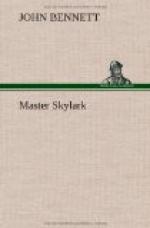“But, Tom,” cried Carew, brokenly, “look it straightly in the face; I am no such player as I was,—this reckless life hath done the trick for me, Tom,—and here is ruin staring Henslowe and Alleyn in the eye. They cannot keep me master if their luck doth not change soon; and Burbage would not have me as a gift. So, Tom, what is there left to do? How can I shift without the boy? Nay, Tom, it will not serve. There’s Cicely—not one penny laid by for her against a rainy day; and I’ll be gone, Tom, I’ll be gone—it is not morning all day long—we cannot last forever. Nay, I cannot leave him go!”
“But, sir,” broke in Nick, wretchedly, holding fast to Hey wood’s arm, “ye said that I should go!”
“Said!” cried the master-player, with a bitter smile; “why, Nick, I’d say ten times more in one little minute just to hear thee sing than I would stand to in a month of Easters afterward. Come, Nick, be fair. I’ll feed thee full and dress thee well and treat thee true—all for that song of thine.”
“But, sir, my mother—”
“Why, Carew, hath the boy a mother, too?” cried the writer of comedies.
“Now, Heywood, on thy soul, no more of this!” cried the master-player, with quivering lips. “Ye will make me out no man, or else a fiend. I cannot let the fellow go—I will not let him go.” His hands were twitching, and his face was pale, but his lips were set determinedly. “And, Tom, there’s that within me will not abide even thy pestering. So come, no more of it! Upon my soul, I sour over soon!”
So they came on gloomily past the bear-houses and the Queen’s kennels. The river-wind was full of the wild smell of the bears; but what were bears to poor Nick, whose last faint hope that the master-player meant to keep his word and send him home again was gone?
They passed the Paris Garden and the tall round play-house that Francis Langley had just built. A blood-red banner flaunted overhead, with a large white swan painted thereon; but Nick saw neither the play-house nor the swan; he saw only, deep in his heart, a little gable-roof among old elms, with blue smoke curling softly up among the rippling leaves; an open door with tall pink hollyhocks beside it; and in the door, watching for him till he came again, his own mother’s face. He began to cry silently.
“Nay, Nick, my lad, don’t cry,” said Heywood, gently; “’twill only make bad matters worse. Never is a weary while; but the longest lane will turn at last: some day thou’lt find thine home again all in the twinkling of an eye. Why, Nick, ’tis England still, and thou an Englishman. Come, give the world as good as it can send.”
Nick raised his head again, and, throwing the hair back from his eyes, walked stoutly along, though the tears still trickled down his cheeks.
“Sing thou my songs,” said Heywood, heartily, “and I will be thy friend—let this be thine earnest.” As he spoke he slipped upon the boy’s finger a gold ring with a green stone in it cut with a tall tree: this was his seal.




